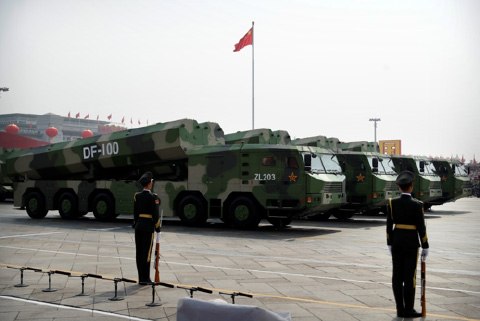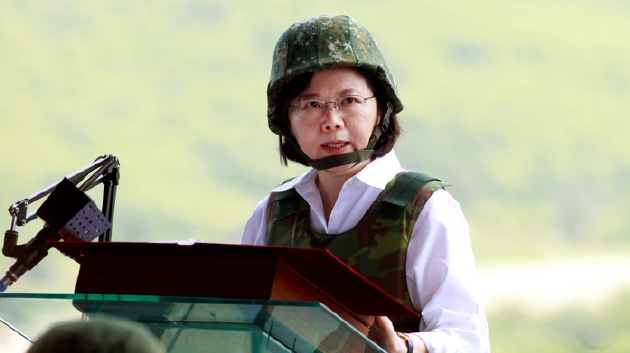Corona Prevented China’s Military Activities?
Taiwan’s President Tsai Ing-wen observes speech on the possibility of fighting China’s military. (photo:AP/Aflo)
The coronavirus was a miscalculation for Mr. Xi’s original plan to counterattack Hong Kong and Taiwan.
In December 2019 before the corona problem became apparent, it seemed as if China would engage in military action to capture Taiwan and Hong Kong. China’s blueprint for the future was beginning to shatter.
Mr. Xi Aims for Recovery Through Military Action
During 2018 Taiwanese local elections, the China-leaning Kuomintang (KMT) party won in a landslide. At the time, President Tsai’s approval rate was as low as 20%. Mr. Xi approached Taiwan to implement a “one country, two systems” policy in January 2019, and threatened them with military rule if they were to reject. Mr. Xi may have thought that things would go his way in acquiring Taiwan if KMT won January 2020’s election.
In 2019, China also revised the extradition bill in Hong Kong and aimed to complete the “sinicization of Hong Kong” by making it possible to arrest democracy activists.
In reality, things took opposite directions. In Taiwan, President Tsai won by a landslide; in Hong Kong, the extradition bill has been withdrawn and large-scale democracy protests have been ongoing.
Last December, a former executive for the maritime self-defense force pointed out that there will be a higher chance for China’s military intervention if Taiwan and Hong Kong problems get out of hand.
“If China’s economy slows down from the U.S.-China trade war and their people are dissatisfied, they can carry out external force,” said Bohao Cho, Taiwan’s military expert.
Mr. Xi has no choice but to engage in military action to overcome current problems.
China Carries Out Decapitation Operations on Taiwan
From the start of 2020, eight people including Taiwan’s top military official were killed in a helicopter crash.
“Many news media reported that the accident was due to poor helicopter and weather conditions. When the U.S. analyzed the black box data that recorded helicopter information, there was no problem with the helicopter itself.
In addition, if weather conditions weren’t ideal, they could’ve used instrument flight to fly at a higher altitude; it’s hard to think that the pilots would sacrifice the safety of the top military official and fly at a low altitude. In a worst case scenario, they could turn back.
China is guilty of being the perpetrator of this incident; there are many ways to work around the system, given that nearly 80% of Taiwan’s military is made of KMT-leaning officers.
There is a possibility that China carried out a decapitation operation by killing the top military official, to send the message: “Tsai Ing-wen, you’re next.”
The U.S. is increasingly wary of China’s movements. On Jan. 10, 2020, the U.S. Secretary of the Army declared the possibility of a battle against the Chinese military force over Taiwan or Japan’s Senkaku Islands.

China’s newly implemented DF-100 missile can snipe Taiwan or the Senkaku Islands. (photo:AP/Aflo)
Coronavirus to Deter Chinese Army
Until now, China has been intervening on surrounding countries and regions through cyber-attacks during Taiwan’s election, armed police officers to suppress Hong Kong democracy activists and sending tanks to the Senkaku Islands.
Due to the worsening coronavirus, China must now focus on domestic problems.
“The Xi administration greatly mobilized its army to counter the coronavirus. It’s not about Taiwan and Hong Kong anymore. There are some infected within the army as well,” Bohao said.
In other words, the coronavirus is acting as a “break” for China’s military activities.
Nowadays, the battle has shifted to an “invisible battleground” — hybrid battles involving military officers acting as normal citizens, cyber battles and the use of biological weapons.
Global societies must now realize how China’s “new threats” were closely approaching their regions amidst the coronavirus outbreak.



















